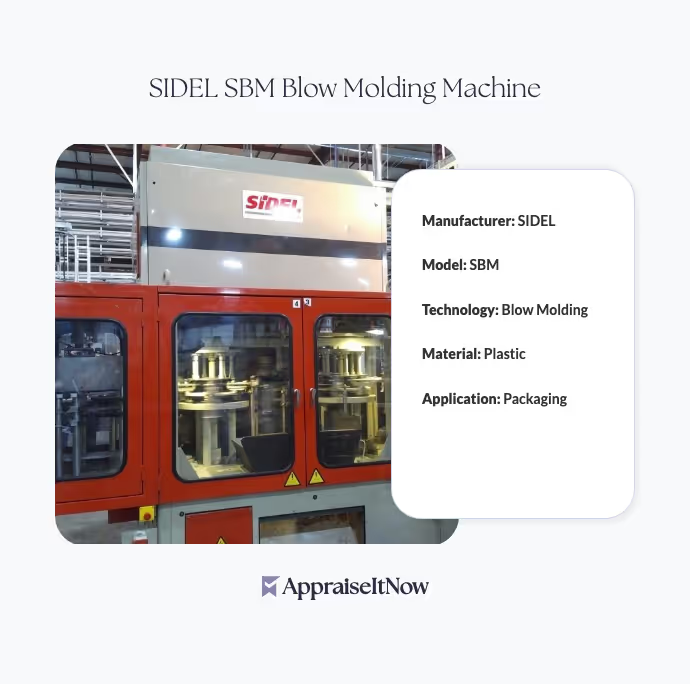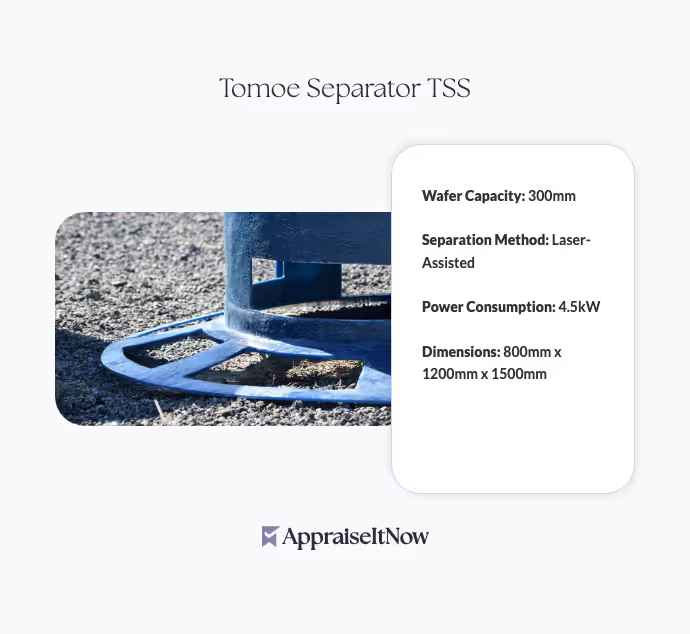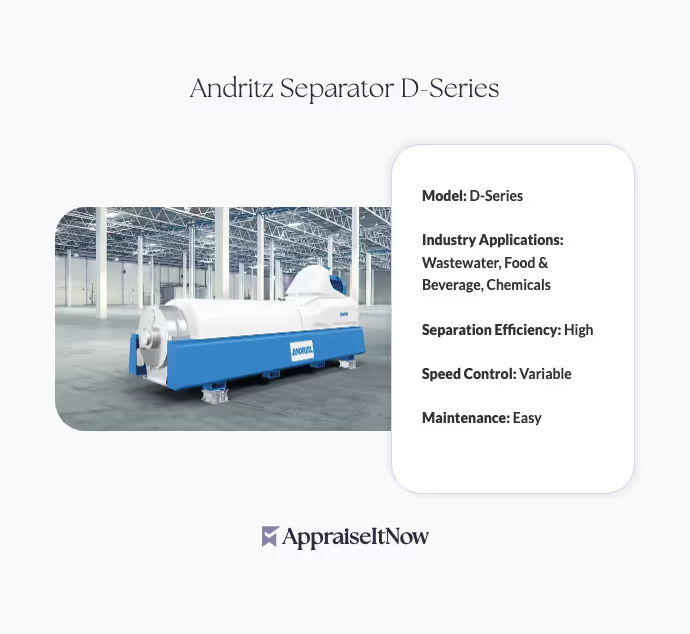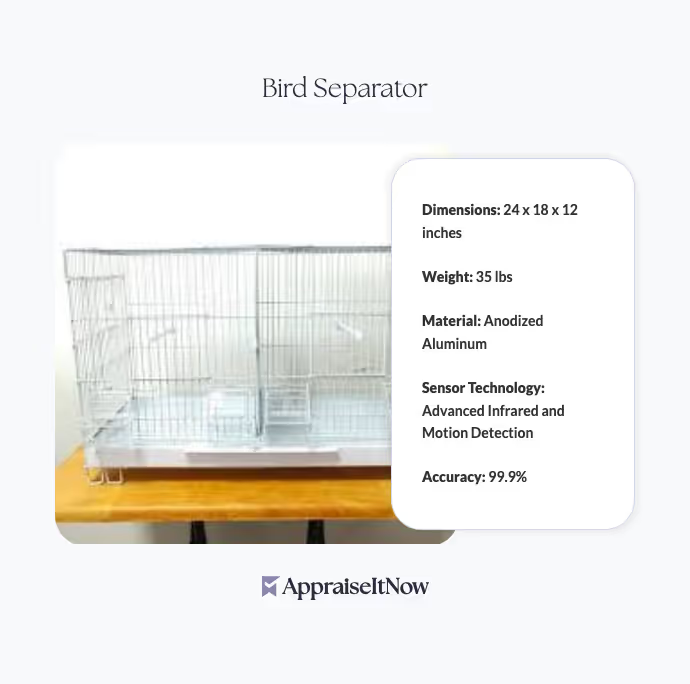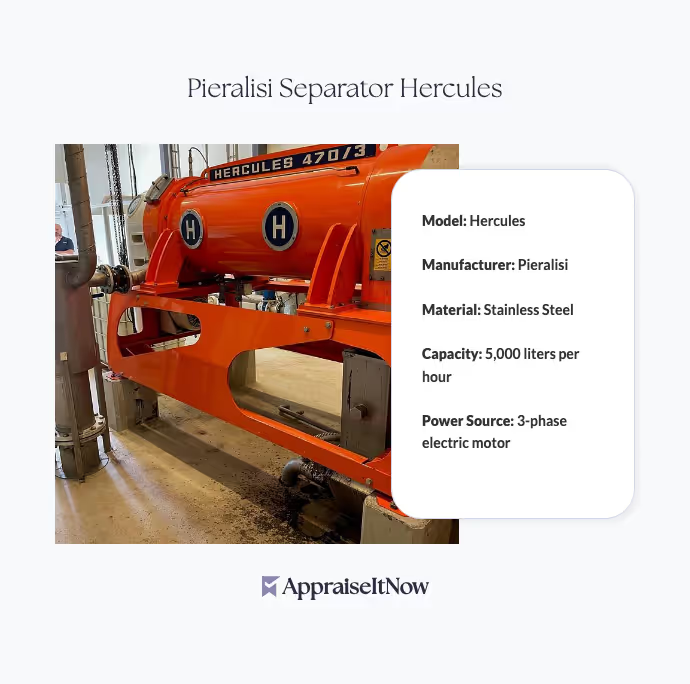<h1>How to Get Your SIDEL SBM Blow Molding Machine Appraised</h1>
<p>The SIDEL SBM (SIDEL Blow Molding) machine is a cornerstone of modern plastic packaging production, with current market valuations ranging from <strong>$350,000 to $420,000</strong>. Whether you're planning to sell, purchase, refinance, or insure one of these sophisticated systems, understanding how to properly appraise your equipment ensures you have accurate documentation and fair market positioning.</p>
<h2>Understanding Your SIDEL SBM's Market Value</h2>
<p>The SIDEL SBM represents one of the most sought-after assets in the <a href="/types/heavy-machinery">packaging and manufacturing equipment</a> sector. First introduced in 1980, this machine has established itself as an industry standard, capable of producing up to 2,000 bottles per hour with exceptional precision. The blend of advanced engineering, proven reliability, and production efficiency makes accurate valuation critical for your business decisions.</p>
<p>Your SIDEL SBM's value stems from several interconnected factors. The machine's energy-efficient design reduces operational costs compared to older technologies, while its advanced process control systems maintain consistent quality across diverse materials and container shapes. These features directly impact manufacturing ROI, which appraisers factor into their valuations. When considering equipment investment decisions, understanding that blow molding machine costs in the $350,000 range reflect both the equipment's performance capabilities and its competitive market positioning helps contextualize your asset's worth.</p>
<div class="callout tip"><p><strong>Valuation Insight</strong></p>
<p>SIDEL SBM machines with documented maintenance records and proven production output typically command values at the higher end of the valuation range.</p></div>
<h2>Key Specifications That Drive Appraisal Value</h2>
<p>Several technical features directly influence how your SIDEL SBM is valued by professional appraisers. The machine's production capacity—up to 2,000 bottles per hour—positions it favorably against competing systems. Its ability to handle multiple plastic materials (PET, HDPE, polycarbonate) and diverse container shapes adds significant value by enabling manufacturers to adapt their production without purchasing additional equipment.</p>
<p>The advanced process control systems built into modern SIDEL SBM units represent cutting-edge automation. These systems monitor pressure, temperature, cooling cycles, and cavity fill rates in real-time, minimizing product defects and material waste. For manufacturers, this translates to lower per-unit production costs and higher margins. Your appraisal documentation should highlight these efficiency features, as they directly support the valuation range.</p>
<p>Customizable configurations available across the SIDEL SBM lineup create meaningful value differentiation. A machine configured with additional cavities, specialized molds for niche container types, or integrated quality control systems may exceed baseline valuations. Conversely, a basic configuration might fall toward the lower end of the spectrum. Professional appraisers understand these nuances and adjust valuations accordingly through comparative market analysis.</p>
<h2>Why Professional Equipment Appraisal Matters</h2>
<p>Understanding whether you need a professional blow molding machine appraisal depends on your specific situation. If you're navigating equipment financing, insurance documentation, tax deduction substantiation, or estate settlement, a certified appraisal becomes essential. Unlike casual estimates, professional valuations provide <a href="/blog/the-basics-of-equipment-and-machinery-appraisal">USPAP-compliant documentation</a> that institutional lenders, insurance companies, and tax authorities recognize and accept.</p>
<p>The question of blow molding machine pricing extends beyond simple equipment cost. A proper appraisal captures the machine's current condition, remaining useful life, technological advancement relative to current models, and actual market demand. This comprehensive approach ensures your valuation reflects fair market value—the price at which a willing buyer and willing seller would transact—rather than optimistic or pessimistic estimates.</p>
<p>For manufacturing business owners, professional equipment appraisal serves additional strategic purposes. If you're planning equipment disposition as part of business restructuring or evaluating capital equipment for balance sheet purposes, detailed appraisals provide the documentation your accountants and financial advisors require. Our comprehensive guides on <a href="/blog/what-you-need-to-know-about-getting-an-equipment-and-machinery-appraisal">equipment and machinery appraisal</a> explore these considerations in depth.</p>
<div class="callout note"><p><strong>Industry Context</strong></p>
<p>The blow molding technology sector continues evolving, making regular reappraisals important for tracking how your SIDEL SBM's value changes relative to newer systems entering the market.</p></div>
<h2>Condition Assessment and Value Impact</h2>
<p>Your SIDEL SBM's physical condition significantly affects its market value. A machine with well-maintained hydraulic systems, properly functioning heating elements, and precise mold alignment commands premium pricing compared to units requiring mechanical attention. Professional appraisers conduct thorough condition assessments examining the structural integrity of the machine frame, the responsiveness of control systems, and the general cleanliness and maintenance of critical components.</p>
<p>Production output history also influences valuation. A machine that consistently achieves rated capacity with minimal downtime demonstrates reliability that appraisers reward with higher valuations. Conversely, units with histories of frequent maintenance issues or reduced production efficiency typically receive downward adjustments. Documentation of preventive maintenance schedules, repair records, and actual production metrics strengthens your appraisal position.</p>
<p>The age of your specific SIDEL SBM model affects valuation through technological advancement considerations. While the original SBM design has proven remarkably durable since 1980, newer SIDEL models incorporate further efficiency improvements and automation enhancements. Appraisers account for this technological progression when establishing values, recognizing that a well-maintained 2005-era machine may hold different value than an identical 2015-era unit despite similar physical condition.</p>
<h2>Documentation Requirements for Accurate Appraisal</h2>
<p>Preparing thorough documentation before your appraisal appointment significantly influences valuation accuracy and supports the professional assessment process. Gather your original purchase documentation, including invoices and manufacturer specifications. These documents establish the machine's original capability benchmarks against which current condition and remaining useful life can be assessed.</p>
<p>Maintenance and repair records prove particularly valuable. When you can demonstrate consistent preventive maintenance—regular fluid changes, component inspections, bearing lubrication, and mold maintenance—appraisers recognize that you've actively extended the machine's operational lifespan. Conversely, spotty or absent maintenance documentation creates uncertainty about hidden wear, potentially resulting in conservative valuations.</p>
<p>Production data documenting actual output over time provides objective evidence of equipment performance. If your manufacturing records show that your SIDEL SBM consistently achieved 1,800-2,000 bottles per hour across various material types and container designs, this validates the machine's current functional capability. Technical specifications alone don't capture real-world performance reliability that appraisers value in their assessments.</p>
<p>Photographic documentation from multiple angles, including close-ups of critical components and overall facility context, helps appraisers understand equipment condition without requiring extended on-site time. Quality photographs of the control panel, hydraulic systems, heating apparatus, and mold configurations provide visual reference supporting your written documentation.</p>
<h2>The Manufacturing Landscape and SIDEL SBM Positioning</h2>
<p>Understanding the broader manufacturing context helps you appreciate your SIDEL SBM's positioning within current industry dynamics. The blow molding sector continues expanding globally, driven by increasing demand for plastic packaging across beverages, personal care, and food processing industries. This sustained demand supports equipment valuations, as manufacturers maintain strong interest in acquiring proven, reliable production systems.</p>
<p>Manufacturing businesses considering equipment acquisition often evaluate whether starting or scaling with used SIDEL SBM machines offers better value than purchasing new systems. The comparison typically reveals that quality used equipment commands strong secondary market prices due to proven track records and immediate operational capability. Your appraisal documentation should emphasize how your SIDEL SBM's reliability and established performance record support its valuation in this competitive context.</p>
<p>For manufacturers evaluating <a href="/blog/the-essential-guide-to-food-processing-equipment-appraisal">food processing equipment</a> and beverage production systems, SIDEL blow molding capability represents essential infrastructure. Whether your machine supports bottled water, juice, dairy products, or other container-based packaging, the underlying production economics remain consistent. Appraisers understand these manufacturing fundamentals and factor them into valuations through comparative market analysis of recent equipment transactions.</p>
<div class="callout tip"><p><strong>Market Perspective</strong></p>
<p>The SIDEL brand's reputation for durability and technical support enhances your machine's resale appeal compared to lesser-known manufacturers, supporting premium valuation positioning.</p></div>
<h2>Financing and Tax Considerations</h2>
<p>If you're appraising your SIDEL SBM for equipment financing purposes, the valuation document serves as critical collateral documentation. Lenders require certified appraisals establishing fair market value to determine appropriate loan-to-value ratios. A professional appraisal that demonstrates your machine's $350,000-$420,000 valuation range supports competitive financing terms by providing institutional lenders the documentation they require for equipment-backed loans.</p>
<p>Tax deduction substantiation represents another important appraisal application. If you're claiming depreciation or substantial repairs as business tax deductions, IRS guidance requires supporting appraisal documentation for major assets. A certified appraisal establishes the asset's fair market value basis for these tax calculations, ensuring your accounting treatment aligns with IRS requirements for <a href="/types/equipment-and-machinery">equipment and machinery</a> valuations.</p>
<p>Estate planning and asset distribution situations frequently require equipment appraisals. If your SIDEL SBM is part of business succession planning or estate settlement, having a current certified appraisal prevents disputes about asset values among inheritors or partners. Professional documentation provides objective value determination that protects all parties' interests.</p>
<p>Insurance coverage also benefits from current appraisals. Your business property insurance should reflect your SIDEL SBM's actual replacement value, which changes as equipment ages and market conditions fluctuate. Periodic appraisals ensure your coverage remains adequate for actual asset value, protecting against under-insurance during claim situations.</p>
<h2>Why AppraiseItNow Serves Manufacturing Businesses</h2>
<p>AppraiseItNow specializes in <a href="/types/equipment-and-machinery">equipment and machinery valuations</a> across diverse manufacturing sectors. Our network of credentialed appraisers—holding certifications including AAA, ISA, ASA, and CAGA—brings specialized expertise in plastic processing equipment and industrial machinery. Whether your SIDEL SBM is one piece of a broader equipment portfolio or a critical single asset, we can provide accurate, <a href="/blog/the-advantages-of-professional-equipment-and-machinery-appraisal">USPAP-compliant valuations</a> accepted by financial institutions and regulatory bodies.</p>
<p>Our tech-enabled platform streamlines the appraisal process. Rather than coordinating complex on-site visits, you can submit photographs, technical specifications, and maintenance documentation securely through our online system. Your credentialed appraiser reviews submitted materials, may conduct brief follow-up consultations, and delivers detailed valuation documentation suitable for any business purpose you require.</p>
<p>Turnaround times for equipment appraisals typically span 5-10 business days from documentation submission, faster than many traditional appraisal firms require. This efficiency helps you meet financing deadlines, accounting cutoff dates, or transaction timelines without unnecessary delays. For manufacturers managing critical business decisions around equipment acquisition or disposition, this responsiveness matters substantially.</p>
<div class="callout note"><p><strong>Key Takeaway</strong></p>
<p>A certified appraisal of your SIDEL SBM Blow Molding Machine provides the professional documentation necessary for financing decisions, tax substantiation, insurance coverage, or equipment transactions. Whether your machine falls at the $350,000 or $420,000 end of the valuation spectrum depends on specific condition, age, configuration, and market dynamics that professional appraisers expertly assess through comprehensive evaluation and comparative market analysis. By partnering with credentialed appraisers who understand manufacturing equipment and industry practices, you ensure accurate valuation that serves your business interests whether you're buying, selling, financing, or insuring this valuable production asset.</p></div>
